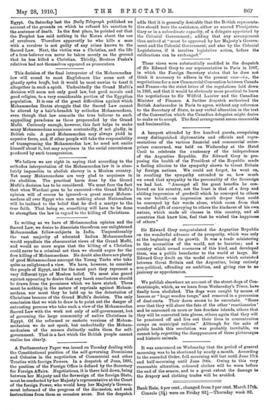In writing as we have of Mohammedan opinion and the
Sacred Law, we desire to dissociate therefrom our enlightened Mohammedan fellow-subjects in India. Unquestionably the vast majority of educated Indian Mohammedans would repudiate the obscurantist views of the Grand Mufti, and would no more argue that the killing of a Christian could never be a criminal act than we should argue for the free killing of Mohammedans. No doubt also there are plenty of good Mohammedans amongst the Young Turks who take quite as enlightened a view. We have, however, to consider the people of Egypt, and for the most part they represent a very different type of Moslem belief. We must also guard against appearing to desire that any harsh conclusions should be drawn from the premisses which we have stated. There must be nothing in the nature of reprisals against Moham- medans, nor must they be held up to the detestation of Christians because of the Grand Mufti's decision. The only conclusion that we wish to draw is to point out the danger of entrusting persons who take such a view of the Mohammedan Sacred Law with the work not only of self-government, but of governing the large community of native Christians in Egypt. Of the reformed or esoteric versions of Moham- medanism we do not speak, but undoubtedly the Moham- medanism of the masses distinctly unfits them for self- government. That is a fact which the British people cannot realise too clearly.














































 Previous page
Previous page